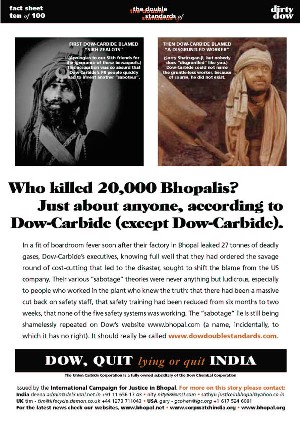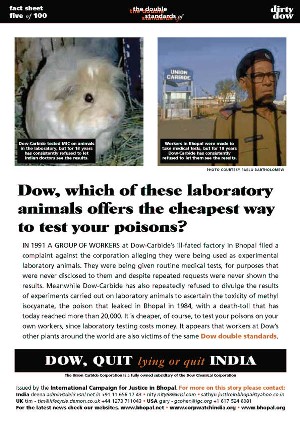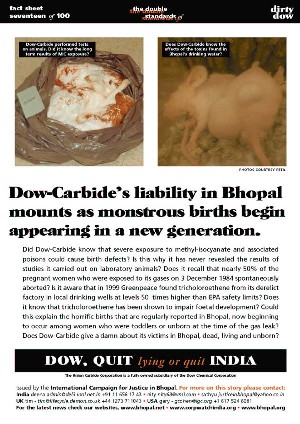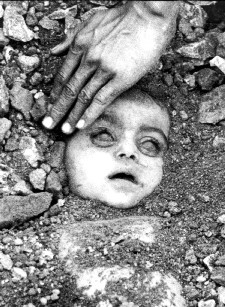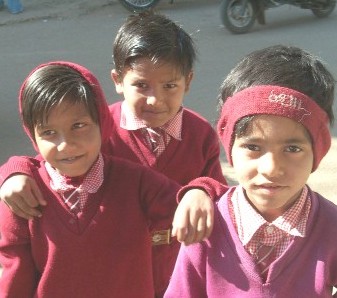
Do you care about Justice?
For the past two decades, some of the poorest people on earth,
sick, living on the edge of starvation, illiterate, without funds,
powerful friends or political influence, have found themselves fighting
one of the world's biggest and richest corporations, backed by the
government, military, and, it often seems, even the judiciary of
the world's most powerful nation. The corporation and its allies have it all - wealth, power, political influence, lawyers, PR companies, the ear of presidents and prime ministers, the power to bend policy to their will, and manipulate the courts and laws of two countries to avoid justice in either. The 'nothing people' have literally nothing. If thirty-five thousand of them clubbed together they could not afford one American attorney. Their efforts to obtain justice have been thwarted in every way possible by the corporation that killed their families and ruined their lives. Naively trusting that the Indian government would come to their rescue, they were instead abandoned, sold down the river by politicians and judges, obstructed and swindled by corrupt bureaucrats, cheated by unscrupulous quacks and not infrequently beaten by their own police for daring to complain. The campaign itself has been conducted on the most unequal terms. On one side, multi-million dollar budgets and the best professional brains money can buy - armies of corporate lawyers, political lobbyists, spindoctors and media manipulators (including Burson Marstellar, the world's biggest PR company) - on the other a handful of unpaid volunteers often without money for stamps, photocopying, telephone bills, or travel. It's David against an army of Goliaths. Yet the survivors of Bhopal not only refuse to give up, they have led an unbending fight for justice. Not only is this fight being won, it has the potential to realize a safer and healthier world for everybody. Bhopal is the corporate crime par excellance – quite literally. Long before the Enron or Worldcom scandals, the CEO of Union Carbide, Warren Anderson – and the Union Carbide Corporation itself – were charged with culpable homicide in India after Bhopal. Both the corporation and its former CEO are considered “fugitives from justice” by the Indian Government, and Warren Anderson lived as a fugitive, in hiding, for more than a decade. (1) They remain fugitives today. Bhopal began as a classic instance of corporate double-standards: Union Carbide was obliged to install state-of-the-art technology in Bhopal, but instead used inferior and unproven equipment and employed lax operating procedures and maintenance and safety standards to those used in its US 'sister-plant'. The motive was not simply profit, but also control: the company saved $8 million, and through this deliberate under-investment managed to retain a majority share of its Indian subsidiary. (2) On “THAT NIGHT,” none of the plant’s safety systems - six in all - were operational, and the plant siren had been turned off. Following the massacre, Bhopal became a test case for corporate accountability. While the world anticipated an exemplary punishment for Carbide - such as ownership of the $10 billion corporation's assets being transferred to the survivors - US courts allowed Carbide to take the case to India, far away from its asset base.
There, the company used a strategy of delay, denial and disinformation. It contested the legitimacy of courts it had asked to be tried before. It denied it was a multinational. It claimed the gas was not ultra-hazardous. It blamed an unnamed saboteur. It appealed court orders for humanitarian relief, while professing its concern for the victims. The strategy worked. Once Union Carbide and the government of India had hatched an out-of-court settlement, hazardous enterprises everywhere had the go-ahead to carry on business as usual, safe in the knowledge that the price for industrial massacre had been set at just 48 cents a share. Today, they’re not so sure. Setting a legal precedent, in March 2004 the Second Circuit Court of Appeals – second only to the US Supreme Court – ruled that Union Carbide can be held accountable in US courts for environmental cleanup and medical monitoring costs in Bhopal, a world away. Dow has been summoned to appear in Bhopal to explain why it continues to harbor its subsidiary, a fugitive, from trial, and its Indian assets risk seizure. And Dow-Carbide has the dubious honor of becoming the first corporation ever indicted for crimes against human rights by Amnesty International. Bhopal remains a test case for corporate accountability: one it’s possible for us to win, and which we can’t afford to lose. Is “$500 good enough for an Indian?” Dow apparently
thinks so, and its public relations spokeswoman even said so, explaining
why the company refused to consider further compensation for the
victims of Bhopal is a catalogue of double standards. In Bhopal, the complete failure of plant safety systems meant thousands were gassed to death. At Union Carbide’s sister plant in Institute, West Virginia, safety systems were not only functional, they were computerized. In Bhopal, Carbide refused to plan with local authorities in case of disaster, and in the event claimed the ultra-hazardous methyl isocyanate was no more dangerous than tear gas. At Institute, local planning and disaster scenarios were in place. In Bhopal, MIC was stored in quantities that dwarfed any other plant in the world – more than 60 tons, far exceeding Institute and the EU’s recommended guidelines. The settlement reached between Union Carbide and the Indian Government awarded an average of $500 in compensation to the victims of Bhopal, or 7 cents per day – the cost of a cup of tea. Alaskan sea otters injured in the Exxon Valdez disaster were kept alive with airlifted lobster at a cost per animal of $500 per day. Following its purchase of Union Carbide, Dow set aside $2.2 billion to resolve Carbide’s US asbestos liabilities, but has not acted to stop the ongoing contamination of tens of thousands in Bhopal – a grim fact many consider inhumane, unjust, and immoral. "In its timing and in the composition of the principal actors, Bhopal is a curtain raiser to the sordid drama of Globalisation. Bhopal is a window to what lies at the end of Globalisation." - Satinath Sarangi, Genoa, July 2001.
The disaster in Bhopal was a product of today’s system of globalization, and a direct consequence of double standards in safety, the routine violation of worker's rights, a callous disregard for the lives of people from poor, marginalized communities and a calculus of environmental harm, all framed within an inequitable yet complicit relationship between governments and Big Business. Dow executives and Board members have continued to insist that India’s 'polluter pays' laws do not apply, that they have no responsibilities in Bhopal, and that they intend to do nothing there to stem the contamination or protect human health. Both the accident - a product of Union Carbide's cost cutting and double-standards - and the company's behavior since then represent the worst abuses of globalization and corporate power. Bhopal was not only a disaster, but was also, and continues to
be, a fundamental violation of human rights. Amnesty International
cites Bhopal
– and Dow-Carbide – as the leading example of the corporate
violation of human rights: “The Bhopal case illustrates how
companies evade their human rights responsibilities and underlines
the need to establish a universal human rights framework that can
be applied to companies directly.” In its 2004 report on the
Bhopal disaster, “Clouds of Injustice”, Amnesty writes
that “Thousands of people in Bhopal were denied their right
to life, and tens of thousands of people have had their right to
health undermined. Those struggling for justice and the right to
a remedy in Bhopal have been frustrated in their efforts. Thousands
of poor families have suffered illness and bereavement, further
impairing their ability to realize their right to a decent standard
of living. "Massive suffering resulted from the UCC leak, yet Dow-Carbide continues to evade its responsibilities under the law," says Amy O'Meara of Amnesty International USA. "Dow must ensure that Union Carbide appear before the Bhopal Court. Victims have the right to be heard in court, and multinational companies shouldn't be able to skip town or hide behind subsidiaries or mergers. This case tragically demonstrates that transnational companies need to be better regulated to eliminate corporate complicity in human rights abuses." Read Amnesty International’s complete report online at http://web.amnesty.org/pages/ec-bhopal-eng. Carbide’s
chemical wastes have contaminated a vast swathe of Bhopal with
dangerous toxins and chemical compounds. Abandoned vats of pesticides
stain the old factory grounds, and acres of fertile In 1999, testing near the site revealed mercury at levels between 20,000 and 6 million times those expected. Carcinogenic and mutagenic chemicals have also poisoned the water supply; trichloroethene, a chemical that has been shown to impair fetal development, was found at levels 50 times higher than EPA safety limits. Testing published in a 2002 report revealed poisons such as 1,3,5 trichlorobenzene, dichloromethane, chloroform, lead and mercury in the breast milk of nursing women. Although “polluter’s pay” is the law in India, Dow refutes the principle and has adamantly refused any responsibility for a cleanup. (3) Until Dow-Carbide cleans up its contamination in Bhopal, it will continue to spread, leach, and poison everything in its path, extending the “dead zone” in Bhopal. Bhopal taught the chemical industry that accidents aren’t
worth the cost of prevention. Instead, two decades after the disaster,
accidents are frighteningly regular at the 15,000 chemical facilities
in the Even without an accident, so many hazardous chemicals are released that the EPA set up a reporting system called the Toxics Release Inventory (TRI). In 2003, according to the TRI, releases of almost 650 toxic chemicals were reported, totaling more than 4.44 billion pounds. Some of those releases may have been in your backyard. We all remain at risk because – even in the wake of Bhopal - the chemical industry has never felt the sting of accountability. Two decades later, we’re all living in Bhopal. “The law is like a web, big insects fly right through it, only the little ones get caught…” In 20 years, Union Carbide has never had to defend its actions in open court, and has never had to face those who lost their health, their livelihoods, and their loved ones. Instead, like a fugitive, it has fled the criminal charges of culpable homicide that it faces in India, and still refuses to appear despite multiple summons dating back to 1991. From the United States, the company thumbs its nose: "Union Carbide and Mr. (Warren) Anderson, the former CEO, are named in [the criminal case]. They have not come forward. Their position on the matter is that the Indian government has no jurisdiction over Union Carbide or Mr. Anderson; therefore, they are not appearing in court," John Musser, Dow’s spokesman, commented in 2003. In a congressional letter signed and sent in July, 2003, 18 U.S. Representatives put things differently: "More disturbing is the manner in which Union Carbide and Dow Chemical have ignored the summons of the Bhopal court. This exposes a blatant disregard for the law." Showing no shame, Dow has even sued nonviolent Bhopal protestors for daring to rally outside its Indian headquarters. Union Carbide workers led the fight to keep safety measures in
place before the disaster. Worker's unions petitioned factory management,
local communities, local and national officials Unions have been at the forefront of the Bhopal campaign from the start. In a rehabilitation scheme, gas-affected women were given stationary work by the state government, but paid so poorly they refused it as an insult. In 1987 they formed the BGPMSKS, or Bhopal Gas Affected Women Stationery Employees Union, and chanted their demands from dawn to dusk in front of the Chief Minister's office. Unsatisfied, on June 1st, 1989, more than 100 women, many with children in their arms, marched 750 kilometers to New Delhi to petition the Prime Minister. Many sold everything to join the march, and a few suffered miscarriages. Even after returning, it took months of struggle before some of their demands were met. The women survivors of BGPMSKS are the core of the International Campaign for Justice in Bhopal. The President of BGPMSKS, Rashida Bee, and its Secretary Champa Devi Shukla, were awarded the Goldman Environmental Prize in 2004 for their leadership of the campaign. "When Governments and Corporations do not live up to their obligations, it is only solidarity among workers, trade unions and people's groups that can carry us forward," Rashida told the annual gathering of PACE employees in Clare, Michigan, in 2003.
Bhopal is a stark reminder that occupational health issues can quickly become public health catastrophes, particularly in the petrochemical industry. Twenty years later, many of Union Carbide’s former workers in Bhopal are still fighting the company for adequate compensation and have requested access to the results of blood testing and examinations that Union Carbide conducted on its employees prior to the disaster. These requests have also been denied. By contrast, the occupational health community has been supportive. In November, 2004, two gas survivors and leaders of the International Campaign for Justice in Bhopal, Rashida Bee and Champa Devi Shukla, were awarded the Occupational Health & Safety Award by the American Public Health Association. Bhopal marked the birth of the modern right-to-know movement. Carbide management declined to inform local communities about the hazards in the plant or how to protect themselves and had no emergency planning or evacuation plan. The result was thousands of avoidable deaths. As a consequence of Bhopal, 'right-to-know' legislation was enacted in the US and elsewhere. Today Dow-Carbide still refuses to release all of its medical research on the health effects of the gases to treating physicians, calling the information a 'trade secret'. (4) "Many have been forced into destitution, some of the world's poorest people beggared by one of the world's richest corporations, from which came platitudes and evasions but no help." Twenty years after the disaster, more than 120,000 people in Bhopal are still ill. (5) Their breathless bodies no longer able to push handcarts and lift heavy loads, thousands have fallen into destitution and their families have learned the lessons of the abyss, binding cloths round their middles to give an illusion of fullness, giving children unable to sleep from hunger water to fill their empty bellies. Trapped in a cycle of poverty and desperation, their children – often ill themselves – have little hope for a better future. Bhopal’s women and children have suffered the most. According
to Champa Devi Shukla and Rashida Bee, two gas survivors and leaders
of the international campaign, this is why the Shukla: “The women are facing the worst of it. They face the worst illnesses. Their children are born deformed. They get cancer. Girls who are 15 look like they are six. Women don’t have their periods, and then they can’t have children. And the problems have only been compounded after 20 years. You have children born with birth defects. Women have to watch as their children endure all kinds of operations. “And parents have to worry about their daughters not getting married. Potential grooms all wonder about how their family line will continue if they marry women who aren’t having their periods or who give birth to deformed children. Potential in-laws only worry about what they will do if these girls get sick - why should they have to bear the cost of caring for them and feeding them? The illnesses are getting worse, too - TB, cancer. If you look at all these things together, you can see why this is a women’s issue.” Bee: “They even found poison in breast milk - mercury and other poisons. And when infants drink poisoned breast milk, what chance do they really have in life? That poison goes straight to their brains and causes permanent injuries. When a child has a brain injury, what meaning can his life have? “The children do not grow well; they have growth retardation. A girl who is six years old looks like a toddler. One who is 12 looks like she is 6 years old. That’s how severely affected the development of the children is in Bhopal. And their illnesses are the kinds that affect the children psychologically. They ask us all the time about how they will survive and how they will live with these illnesses. They hear that people develop cancer after ten years of exposure to the area and the water. And the children are asking what their lives can mean - what is the use of their lives. That’s what it is like in Bhopal.”
Amnesty International estimates that 22,000 people were gassed to death in Bhopal, including thousands of women and children. Today 30 people die each month from the effects of their exposure, and the death toll from Dow-Carbide’s chemical violence continues to rise. (6) More than 120,000 people are critically ill and in desperate need of medical care, and thousands of children have been born with birth defects, learning disabilities, and stunted growth. Even the breast milk of nursing mothers has been contaminated, and the chemical terror won’t end until Dow cleans up its killing fields.
Are you ready to Get Active? Find out how!!
(1) Anderson and Union Carbide both stand accused of culpable homicide (manslaughter), grievous assault, poisoning and killing of animals and other offenses. Although the Indian Government published proclamations in The Washington Post (January 1st and February 21st, 1992) calling on Mr. Anderson and the Union Carbide Corporation (UCC) to present themselves before the court in Bhopal, neither has obeyed the summons. Both have been labeled “absconders” from justice by the Indian Government. Mr. Anderson disappeared shortly after Interpol released an international warrant for his arrest, and his whereabouts were unknown for more than a decade. See The Washington Post. “India Seeks to Reduce Charge Facing Ex-Union Carbide Boss.” Rama Lakshmi, July 8, 2002. See also the BBC. “India to Extradite Bhopal Boss.” September 6, 2002. Available at: http://news.bbc.co.uk/2/hi/business/2240895.stm. (2) According to Union Carbide’s own documentation, obtained through discovery in the New York civil suit. Much of this documentation is available online, at http://www.bhopal.net/poisonpapers.html. See also New Scientist Magazine. “Fresh evidence on Bhopal disaster.” December 2, 2002. Available at: http://www.newscientist.com/news/news.jsp?id=ns99993140. And: The Financial Express. “Global Funds Tell Union Carbide To Settle Bhopal Gas Leak Claims.” Ajay Jain, December 5, 2002. Available at: http://www.financialexpress.com/fe_full_story.php?content_id=23259. (3) Dow has argued that since it does not own the former Union Carbide factory site in Bhopal (the site was only leased from the Madhya Pradesh government, and that lease has expired), it cannot be held responsible for the contamination there. This stand is contradicted by the Hazardous Waste (Management and Handling) Rule of 1989 594(E), Section 3 Sub section (1) and Section 4(1), which stipulates that the producers of the contaminated waste are responsible for decontamination. The “polluter pays” principle is also enshrined in the Environmental Protection Act, passed in India in 1986. Ruling in Vellore Citizens' Welfare Forum v. Union of India (1996) 5 SCC.647, the Indian Supreme Court declared that, “. . .Once the activity carried on is hazardous or inherently dangerous, the person carrying on such activity is liable to make good the loss caused to any other person by his activity irrespective of the fact whether he took reasonable care while carrying on his activity. The rule is premised upon the very nature of the activity carried on.” Elaborating on the “polluter pays” principle in MC Mehta v. Union of India (1997) 2 SCC 353, the Supreme Court ruled that “polluter pays” principle as interpreted by the Court means that “the absolute liability for harm to the environment extends not only to compensate the victims of pollution but also of restoring the environment degradation.” Nevertheless, Dow continues to argue that the Madhya Pradesh government is responsible for the cleanup (see the Daily Environment Report, No. 144, Monday, July 28, 2003). Additionally, an estimated $300 million of Union Carbide’s 1989 settlement remains undistributed to the victims. Although these funds exist solely to compensate the Bhopal victims for the loss of their health, their livelihoods, and their loved ones, Dow has suggested that the balance of these funds could be used to pay for a cleanup—turning the “polluter pays” principle entirely on its head. In summary, Dow has said both that local government should pay for the clean up AND that gas survivors should pay—the first is in contravention of lawful principle and common sense, while the second contradicts all notions of human decency. See The Midland Daily News. “Annual Meeting Draws Protests, Questions.” Beth Medley Bellor, May 10th, 2002. (4) Cited in The New York Times. “Bhopal Seethes, Pained and Poor 18 Years Later.” Amy Waldman, September 21, 2002. This refusal is inexplicable, as ‘trade secret’ provisions do not, in fact, apply. This was revealed in a Chemical Manufacturers Association (CMA) meeting shortly after the Bhopal disaster, at which Union Carbide representatives were present: “Trade secret protections under the federal standard extend only to chemical identity, not hazard information. …Chemical identity information which is a trade secret is made available to those who have a legitimate need for it, such as treating physicians.” See page 34 of the CMA Executive Committee Meeting Agenda, January 28, 1985, available at: http://www.chemicalindustryarchives.org/search/pdfs/cma/19850128_00000473.pdf. (5) The Washington Post. “India Seeks to Reduce Charge Facing Ex-Union Carbide Boss.” Rama Lakshmi, July 8, 2002. According to The International Medical Commission, Bhopal, “it is our opinion that, if properly defined, categories of permanent damage, partial or total disability, could include about 200,000 survivors.” International Perspectives in Public Health, 1996, Volumes 11 and 12, p. 27. (6) According to The Centre for Rehabilitation Studies’ (an office of the Madhya Pradesh government’s Bhopal Gas Tragedy Relief and Rehabilitation Dept.) 1998 Annual Report, the mortality rate among the exposed community in 1997 was 6.70/1000, whereas in the unexposed community it was 5.37/1000, producing a figure of 665 deaths above the mortality rate in the exposed community - or approximately 50 gas related deaths per month. No official figures exist for subsequent years. Further, according to a 1987 ICMR report, the mortality rate in the exposed community was 9.98/100 and in the unexposed community was 6.03/1000, meaning approximately 150 gas related deaths per month in 1986. Assuming a steady ratio of depreciation in mortality of 6% per year, in 2003 there were therefore over 30 deaths per month due to gas exposure. However, it is worth noting that six monthly morbidity studies conducted by the ICMR between 1987-1991 show that the number of people with gas related symptoms actually increased in that period.
|
The international student campaign to hold Dow
accountable for Bhopal, and its other toxic legacies around the world.
For more information about the campaign, or for problems regarding this
website, contact Ryan
Bodanyi, the Coordinator of Students for Bhopal.
WE
ALL LIVE  IN
BHOPAL
IN
BHOPAL
"The year 2003 was a special year in the history of the campaign for justice in Bhopal. It was the year when student and youth supporters from at least 30 campuses in the US and India took action against Dow Chemical or in support of the demands of the Bhopal survivors. As we enter the 20th year of the unfolding Bhopal disaster, we can, with your support, convey to Dow Chemical that the fight for justice in Bhopal is getting stronger and will continue till justice is done. We look forward to your continued support and good wishes, and hope that our joint struggle will pave the way for a just world free of the abuse of corporate power."
Signed/ Rasheeda Bi, Champa Devi Shukla
Bhopal Gas Affected Women Stationery Employees Union
International Campaign for Justice in Bhopal
This is what the www.studentsforbhopal.org site looked like in early 2008. For more recent information, please visit www.bhopal.net.

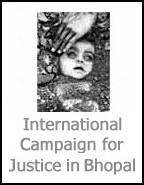
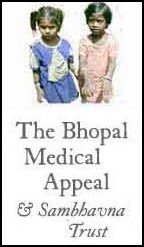


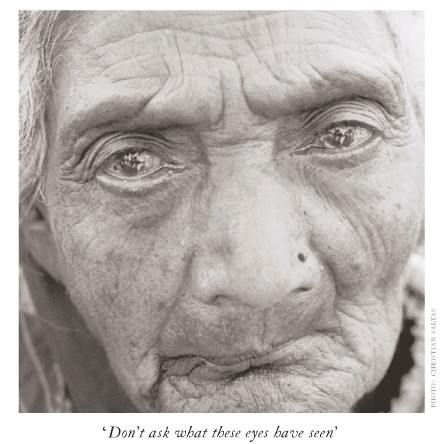
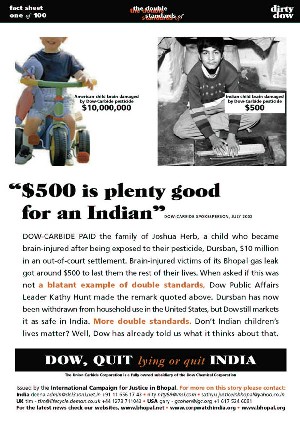
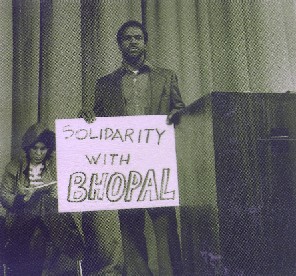 Bhopal
epitomizes the utter failure of international agencies and legal
systems to meet the challenges of a globalized world, where the
protection of health, human rights and the environment depends upon
the possibility of holding corporations fully accountable for their
crimes.
Bhopal
epitomizes the utter failure of international agencies and legal
systems to meet the challenges of a globalized world, where the
protection of health, human rights and the environment depends upon
the possibility of holding corporations fully accountable for their
crimes. 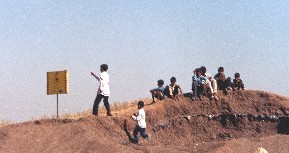 cropland
have been left sterile and desert-like by chemical seepage from
Union Carbide's “solar evaporation ponds.” Children
play in the wasteland despite the danger.
cropland
have been left sterile and desert-like by chemical seepage from
Union Carbide's “solar evaporation ponds.” Children
play in the wasteland despite the danger.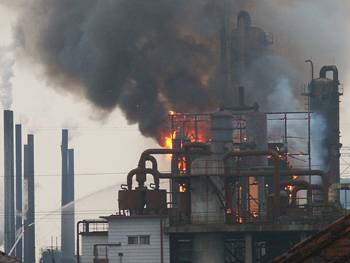 United States. Dow Chemical, for example,
United States. Dow Chemical, for example, 